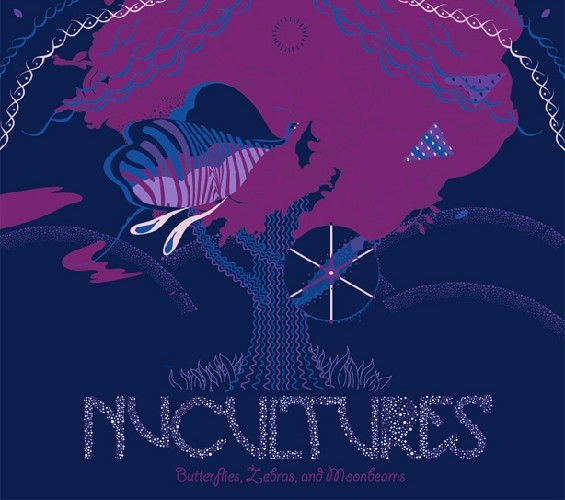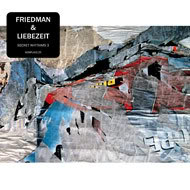A Conversation with Tim Motzer 12/2006
State of Mind Magazine December 24, 2006
This conversation with Philadelphian guitarist‚ producer and experimental sonic manipulator Tim Motzer took place on December 28‚ 2005‚ and after letting it age for close to year‚ it’s still good. At the time of our discussion I was really digging the King Britt Presents Sister Gertrude Morgan album that Motzer collaborated on with King Britt. And guess what? It’s close to a year later and the album is still dope.
What’s happened since? Well‚ Tim did some touring with Ursula Rucker‚ worked with Britt on a few tracks that were featured in the Miami Vice soundtrack and put out two solo albums‚ Soft Lunch (Tilomo) and Secret Voices – No Time For Silence.
Mike McKinley: I really enjoyed this album that you did with King Britt (King Britt Presents Sister Gertrude Morgan). There are a lot of things about it that are really fascinating to me about this project. Taking these Preservation Hall recordings from 1968 of just tambourine and vocals‚ taking those lyrics and then constructing based around that‚ it had to be among other things really fun. It sounds like a fun thing to dig into. What was that experience like?
Tim Motzer: It was really cool‚ and it kind of started out that King had this offer from Ropeadope to do this. They wanted him to do this project and he called me up and said‚ “I want you to hear Sister Gertrude Morgan and tell me what you think.” He goes‚ “I think it’s going to be insane.” And I listened to it and by the first song I was completely like‚ “Yeah‚ man‚ this is going to be awesome. (laughter) Let’s definitely do this.” And so we got started on it‚ and it was just a pretty amazing project. It was fun to do‚ but we kind of treated it like she was there with us in the studio. And so we were the band‚ so it was our job to try to find the right music for each of her songs. We would basically jam around with different rhythms and try to find the right grooves and feels to go with her voice and then build the tracks from there.
MM: It came out really great. Another thing that is interesting about it is‚ sonically‚ it sounds like now‚ but there’s this really rich history with the music and where she comes from. It kind of goes along with the history of American music in a lot of ways.
TM: Exactly. Well I think in some ways‚ especially in the guitar department‚ I think we were trying to conjure up the Mississippi Delta a lot. You know&ssbquo; with the slide guitars and the bluesy swampy guitars. Like in “Let’s Make a Record” or “Power‚” or maybe even “Living World.” So a New Orleans thread is there‚ but I think also part of the record goes back to Africa as well. You can trace the thread back. With the Afrobeat tracks‚ even the hip-hop. It’s kind of all in there. It’s a big stew of stuff. And there are modern elements‚ of course‚ with electronics and stuff. But basically‚ we’re trying to keep it around guitars and organs and harmonicas‚ bass lines and beats and her voice and tambourine-the tambourine is a major part of the record. It’s amazing. King actually had his engineer‚ Jeff‚ time-stretch her performances so they were all really locked to a time grid so we could actually go in and lock into that. So it kind of went from there.
MM: Cool. The other thing is that‚ I know there’s a track on there where King is talking about the Devil’s music.
TM: Right. (laughs)
MM: That brief little thing‚ talking about jazz.
TM: Right‚ the tritone. The Devils chord. Hence the blues and everything and jazz.
MM: But she didn’t really have any issues with that‚ being kind of a religious figure?
TM: No‚ I think for her-I mean‚ she said this-she went to New Orleans‚ and she would go to the streets where all the bad stuff was going on because those were the people that needed to hear the words. So I don’t think that scared her away.
MM: It’s a cool thing coming through on the record because it’s this merging of secular music and also religious music.
TM: Right. It’s kind of weird‚ too‚ because not everybody sees this as a gospel album or something. I think it kind of transcends that. It’s certainly spiritual‚ but I think the listener can take what he or she wants out of it. It just hits me as a record of celebration and a record of hope really. Especially in these crazy times. Like‚ 2005 was just insane on this planet‚ so it’s kind of nice to hear something coming from a deep space like that.
MM: Right. Something that uplifts the human spirit a little bit.
TM: Exactly. There’s got to be some hope‚ right? And I think she’d be thrilled to know that her work is still echoing and vibrating on the planet. The other really cool thing about this project is that she kind of did this in ’68‚ and its release was probably very limited. Maybe 500 or 1‚000 copies maybe got out there. No one’s really heard a lot of it really‚ and for us to have a live band touring around in Europe‚ or Portugal or New York to packed houses‚ and Sister Gertrude’s singing‚ it’s pretty heavy really. So she’s still rockin’ it. I think she’d be pretty happy.
MM: Yeah‚ that’s cool. So how are the shows? You’ve done some shows doing this material.
TM: Yeah‚ we’ve been touring quite a bit. We started off in Finland in Helsinki at the Flow Festival. That was our debut. We flew over there with the full band and multi-media. The record hadn’t even come out yet over there when we played. You know‚ when you play a festival crowd‚ it’s usually pretty packed with people‚ usually pretty open-minded people-because festivals are like that. You can go in and just check out a lot of new bands you’ve never heard‚ and people just loved this thing. We played‚ and they were just totally blown-out. The first couple songs‚ they were like‚ “What?!?” Because they were expecting King Britt‚ who’s primarily known as a House DJ‚ a really great DJ from Philly. I think they were expecting some sort of electronica/house thing‚ and it comes out like full live band‚ kind of like Led Zeppelin or something. (“laughter”) So it was pretty heavy. The visuals are also amazing‚ because a song like “Power‚” the visuals are showing George Bush and the Middle East and visions of war and things like this along side of good things that are going on on the planet. It’s quite powerful visually as well as musically.
So we started there‚ and we did some shows here in Philadelphia at the Painted Bride and also the World Café‚ which is part of WXPN. We did a live broadcast for David Dye’s World Café. From there we went to Europe and played in Paris and Berlin‚ and then we did three shows in Portugal. Then we came to London‚ had a great show at the ICA‚ then flew into New York and played there at the Canal Room. It was just really wonderful touring this music and watching it evolve every night‚ because it did evolve because of the players on the tour. Chuck Treece on drums. I don’t know if you know Mark Boyce. He’s been with Boss Hog and The Delta 72-great keyboard player. Barry Meehan on bass‚ myself‚ and then King Britt was doing dub effects and turntables and MCing the show‚ and then we had the multimedia. So‚ it was quite an experience‚ and we’re planning on doing more in the summer. Here and there kinds of things. We just got done with that first leg of really getting it out there.
MM: I’m kind of curious if the reaction was different in Europe as opposed to doing it here.
TM: I must say‚ because I tour a lot in Europe‚ with Ursula Rucker especially‚ and it seems like there’s always a better reaction overseas to any of these projects we’re doing. Especially the more creative ones. And that’s not to put down the American audiences or anything. It just seems to be that Europeans or the Portuguese‚ or whoever‚ seem to be more open minded to different types of music and deeper music. The only thing I would say about Sister Gertrude is there’s no vocalist standing on the stage. (laughter) So the audiences that are not knowing what’s going to happen‚ you know‚ they’re hearing this voice and going‚ well‚ where is she? So to have to understand what we’re doing‚ you have to understand the concept of it.
MM: Right.
TM: We played in Las Vegas in a festival there as well in October. It was called the Vegoose Festival and it was basically a jam band kind of festival‚ like Bonnaroo. I think it was the first year they did it in Las Vegas. Bands like Primus were there‚ Beck and the Flaming Lips‚ and Arcade Fire‚ and it was just jammed with kids who were into that kind of music. And they really dug what we were doing and they had never heard of any of it before. So it kind of transcends. People get it.
MM: It’s an interesting thing. Most musicians I talk to that have played in Europe or Japan have had a great experience.
TM: Yeah. It’s just insane and it’s that cultural experience‚ as well‚ going on.
MM: I remember guitarist Kurt Rosenwinkel having a lot of funny things to say about the difference between being a jazz musician in America‚ where jazz is taken for granted a lot. And he was saying that people in Europe are just like‚ “Whoa!”
TM: They’re rock stars over there. Yeah‚ and Kurt’s a master too. He’s insane. It’s just totally different worlds. Ursula Rucker’s that way as well. In Portugal she’s a star‚ like a big superstar there. She’ll sell out an opera house in Lisbon. But in Philly‚ where she’s from‚ it’s like a different world. It’s like Earth. (laughter)
MM: Right.
TM: And that’s just the way it is! I can’t explain it but it is funny that way and for jazz guys especially. It just seems like the whole thing is shrinking and shrinking and shrinking away. All the heads are there but it’s not like it used to be.
MM: So this other thing you have going know‚ this album you’re putting out…
TM: Which one? (laughter)
MM: You keep your self busy‚ huh? Well there’s this solo album you’re doing.
TM: Oh okay! That’s been a long work actually. It’s been taking a little while. I did release Soup Starship last year so that’s kind of a teaser that’s been hanging out there for awhile. Where the album is now‚ I have about thirteen or fourteen tracks burning away on my hard drive. Smoking‚ you know? I’m trying to get them so they stop.
MM: Right.
TM: I’ve been doing that between tours and between other work‚ making other records or doing remixes with King Britt. So there’s so much stuff going on all the time that when you’re home‚ you’re trying to get stuff done‚ and that’s why this period of time is so sacred right now. December through February is a great time to work‚ so I’m just trying to use those 90 days and finish up a bunch of records. The solo record being one of them. I think it’s gonna be for me a different kind of record than what I’ve been associated with in the past because‚ well‚ first of all‚ it’s the first record I’ve done vocals on. And then secondly‚ it’s probably gonna be more rock-oriented as opposed to electronica-oriented. It’ll probably be a little bit of that kind of stuff in there. It’s kind of coming out of all kinds of influences. So they all get smashed together somehow.
MM: Yeah. It is what it is. That’s cool. So that’s kind of like‚ I don’t know‚ would you say where you’re evolving?
TM: It’s one of the places. I’m just kind of psychotic in that I’m doing lots of different projects. I enjoy so many different kinds of music. Like I just finished an ambient record called Tilomo Soft Lunch and I’m actually shopping that right now and if I don’t get any bites‚ say by February‚ I’m just probably gonna put it on my label. So that’s kind of like electronic guitar meets laptop kind of stuff‚ you know‚ that you could put on really late at night and just chill and enjoy for what it is‚ alpha-beta waves and that. Or I could be into an electric guitar power trio that’s doing completely abstract types of music‚ just totally improv. I’m playing in an electric Miles Davis Group here in Philly that’s got all great players. We do that like once a month. It’s just amazing‚ just playing the music from ’74 and ’75 period Miles.
MM: Oh wow…
TM: And then I’ll do electronic stuff and then I’ll do Ursula stuff which is more acoustic guitar and guitar-synth oriented. So I’m just on all kinds of different waves at the same time. It’s kind of fun to try and get them all done but the key this year is to get them all completed and finished. (laughter)
MM: Right. And not have like…
TM: ….a whole hard drive? (laughs)
MM: Well that makes sense as a musician. You have all these different things that you need to say.
TM: Yeah I don’t understand it but it started a long time ago. And I’ve been into all kinds of different music in my whole life whether it was progressive rock or fusion. Like way back in the day I could have been listening to Bill Evans’ albums or really digging‚ John McLaughlin‚ or even Black Sabbath‚ or even Radiohead or Pink Floyd or whoever it is. I’ve always been into lots of different creative types of music that really expand your mind to some degree. And jam band type bands. I had a band called Jazzheads and Global Illage. Those two bands were around like three years ago and had impact here on Philly. I really enjoy improvisation and just creating new music all the time. And that leads to all these different avenues. So you just have to try to go down them while you can. It’s crazy. (laughter)
MM: Yeah. It’s interesting‚ the whole world of improvising.
TM: And with recording‚ back in the day you had a tape recorder and you would record a live band and do overdubs and stuff. But now everybody’s got computers in their houses so their studios are in their houses and you make records and you can improvise to your laptop and chop it up and do whatever you want. And it’s really an exciting time in the way that you can create music like this. You could never do it before.
MM: So you do a lot of that these days. Just sit at home and just work like a mad scientist.
TM: Pretty much. Mix records and finish tracking different products I’m doing and collaborate with other people as well. Music madness as I call it.
MM: Yeah. That’s great. It’s so much more advanced than the days of‚ like‚ a four-track.
TM: Yeah!
MM: Like… even that blew my mind. (laughter)
TM: Well‚ it’s still insane! The whole idea that you can make a record by yourself. It used to be to record you had to go into a studio and have an engineer and all these things‚ and that’s still a great way to make a record and always will be. But to have this kind of freedom and a lack of time constraint in your own studio and just being able to really sculpt your music out. What a great advance it’s been! (laughter) Since digital has come on the scene. Although some people bitch about the sound and stuff like digital versus analog. But it’s just another medium that we have to work with. And it’s a great one. It’s insane.
http://www.stateofmindmusic.com/entry/37/Conversation-with-Tim-Motzer/


 Previous
Previous  Next
Next